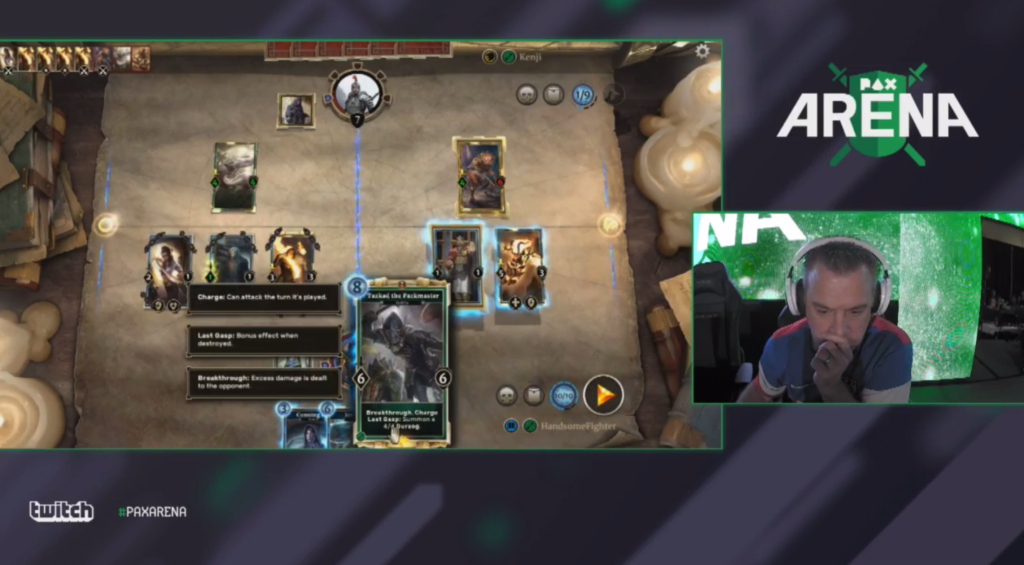At PAX West, Bethesda Softworks held the first official public eSports competitions for its new strategy card game, The Elder Scrolls: Legends. But it wasn’t the first time the public had played the game in organized tournaments. That happened as soon as Bethesda unleashed the open beta for the game, and that fan interaction is what opened the door to another eSport for the game publisher—which is also mapping out a strategy for its 2017 game, Quake Champions.
Pete Hines, vice president of marketing at Bethesda Softworks, talks to [a]listdaily about the opportunities Legends and Champions open up for the game company in this exclusive interview.

Why did you decide to jump into eSports with The Elder Scrolls: Legends?
We felt like Legends was a game that was a good fit for eSports. Most importantly, what we care about is making a game that’s not only fun to play, but fun to watch. Both of those things also make it a good candidate for being an eSport title.
What do you feel are the key ingredients needed for a game to succeed in eSports?
The biggest thing is: it’s got to be a good game that’s fun to play and that’s fun to watch. If you don’t do those two things, then eSports is never going to happen. We tried to focus on aspects that make it really fun and engaging to play and offer a lot of variety and make it a really competitive title.
What does PAX open up as a proving ground for introducing eSport titles to gamers?
One of the things we’ve been able to do here at PAX is not only have competitions and do some streaming with influencers and devs, but also start to have tournaments where fans who have had a chance to play the game in the open beta can come in and try their hand with some of the decks that they’ve created. We’re starting to embrace that idea of it’s a competitive game. It’s about trying to figure out how to make the best decks, how to figure out the meta game, and what everybody else is doing. PAX is a great way to open up that to fans.
What role do influencers play in helping grow a new eSport?
For a title to be successful, it has to have a whole bunch of different elements working. It’s not just one thing. In the case of influencers and streamers, the more people that are exposed to the game and the more they understand how fun it is to play—how fun it is to watch—that only helps. So working with the streamers like TrumpSC, Kolento and Kenji only helps because they’re really into it. Those guys were beating the devs (the guys who designed the game) in matches, so it shows that it’s not just that you can reach an audience, but that those folks are really passionate about games like The Elder Scrolls: Legends.
What can you learn from what Blizzard has done with Hearthstone in eSports?
My approach to Bethesda since I’ve been there is to focus on us and what we’re doing, so a game like Hearthstone is going to do whatever it thinks is best for itself. Same with a game like Magic: The Gathering. We’re going to take our own approach and find our own way to go in terms of the kind of game that it is and the audience that we reach and how we approach eSports.
Outside of PAX, do you see bigger eSports potential for The Elder Scrolls: Legends?
Absolutely. What we did here at PAX is really a case of time and where we were as a game. We have our own QuakeCon, which was one of the very first eSports cons. It’s not just about celebrating gaming but it’s also where we started doing Quake tournaments well before Bethesda was involved with it. I definitely think you’re going to see tournaments and competitions in eSports happening at a variety of shows like PAX, but also in a bunch of other places.
What do you hope to learn from these initial PAX eSports competitions?
Like with anything, you try something, you see what works, and figure out the things that resonate and try to do more of those—and try and figure out the things you didn’t do well, or could have done better, and try and improve. I’m a big believer in that, whether it’s going from one game to the next or one eSports event to the next. So at PAX, we tried some things and hopefully we’ll take those learnings to whatever we do next.
Looking ahead, are there marketing initiatives that Bethesda can use across eSports titles from Legends to Quake Champions?
Yes, one of the things that we believe is that the game has to come first and the eSports will roll out of that. We do have a legacy in eSports with titles like Quake that have been part of the eSports scene for many, many years. And we want to try and take all the things that we’ve learned from running competitions at QuakeCon and outside of QuakeCon with Quake, not only with Quake Champions, but to apply those learnings to Legends, and honestly anything else we do where we think there’s a good fit—or that people are interested in competing and using that game to express themselves in competition.
Do you envision any crossover fan bases across these two eSports games moving forward as they’re rolled out?
Sure. If you’re interested in really fast first-person shooters and you’re also interested in strategy card games, then obviously there’s going to be some crossover. But our mantra has always been: we make the kind of games that we get excited about, and we make them for whoever is interested in those games. So if you’re only interested in strategy card games, then you’re probably not interested in Quake and vice versa. But certainly, exposing all of those to an audience allows you to hit folks who do have an interest and do focus on a lot of different kinds of games, or different genres, and might be interested in competing. Maybe they’re competitive in Quake, but maybe they only play Legends casually or for fun. We want to make sure people are aware. It’s free to play. It doesn’t cost you a thing. Give it a try.
What role does eSports play today in marketing and fan engagement?
Like a lot of things, eSports is just a component. It’s not the defining component. We don’t center everything around eSports. It’s simply one part of the puzzle, and there are a lot of things that have to go into promoting a title, marketing it, and making it a success. ESports is part of that, but it’s just a part. It’s about reaching out to fans, finding out the kinds of things that they’re interested in; the kinds of things that they want to do. In the case of Legends, as soon as we went into open beta, we saw that fans were creating their own tournaments and competitions, which said to us: “ESports should be a part of this because even without us being involved, they’re going out and starting their own tournaments and competitions themselves.” Clearly, it’s something fans are interested in and we simply want to foster that and grow it.

